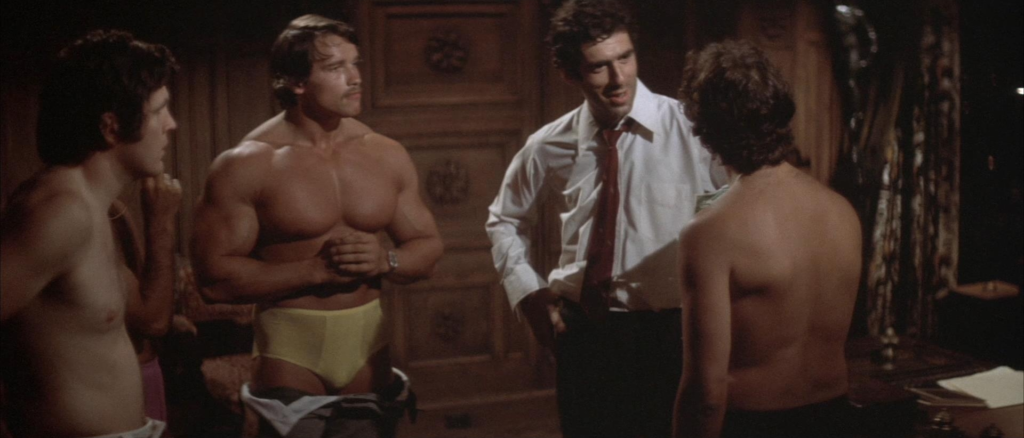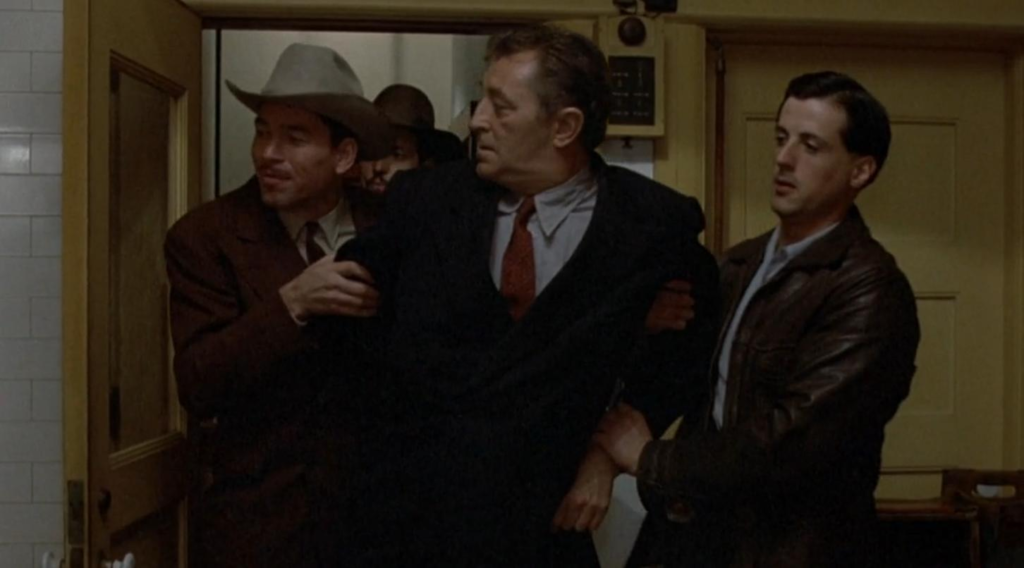When it comes to the private detective archetype, the most archetypical of them all is Philip Marlowe. Sure, there’s Sam Spade, but he’s really only famous for one book, The Maltese Falcon, with Dashiel Hammett’s other famous works involving other, less famous detectives. Also, Hammett incorporated boring shit like “personal experience” and “actual brass tacks of detective work” into his stories, while Chandler, not being from those streets, went for a flashier style, and prioritized things like “action” and “sexiness”. It’s little wonder then that while Hammett’s work is the more accurate of the two, Chandler’s is the one with the more lasting impact. I mean, does Hammett have a trope named after him? I think not. But Chandler has two! (Okay, okay, Hammett has an award named after his Glass Key novel, but the protagonist in that isn’t a private detective, even if he undertakes a murder investigation)
My point is, given how important and influential Philip Marlowe is to the genre of hardboiled or noir or whatever you want to call that specific brand of mystery stories, you’d expect his legacy to be secure well after his death. However, only fifteen years after Chandler’s last Marlowe novel was published, people were starting to reassess Marlowe’s place in the cultural zeitgeist.
The Long Goodbye (1973)

This is the film that was supposed to kill the noir genre. With the help of Leigh Brackett, who had also adapted The Big Sleep for Bogie and Bacall, Robert Altman set about with this movie to systematically deconstruct and destroy Philip Marlowe, and leave the festering corpse of his archetype in the gutter.
The Long Goodbye is a very angry movie. Made after the dream of the 60s had well and truly died, many of the minor characters are the shadows of that dream laid low or twisted. Marlowe’s neighbors are hippies who don’t really do much beyond practicing yoga and getting high. A college kid he runs into a couple of times is a student protester, who gets his ass handed to him by the police. His sleuthing takes him to an addiction clinic, whose primary aim seems less in treating its rich clients and more in fleecing them for all they’re worth. And the goal of all this is quite simple.
Altman was of the belief that the 70s were just too dark and bleak and cynical a time for a man like Marlowe to exist, or at least, to succeed in anything. So he tried to make Marlowe as much of a loser as possible in The Long Goodbye, getting his ass beat in fights, being screwed over constantly, and even losing his pet cat over the course of the movie.
However, I don’t think Altman quite succeeded in his goal of killing the noir genre. For one thing, obviously, this movie kick-started the neo-noir genre in the 70s, with such classics as Night Moves and Chinatown. But more than that, I think the film’s emphasis on the violence and brutality of the early 70s showed, not that a hero like Marlowe was irrelevant, but that the world needed a hero like him now more than ever.
One of the key features of The Long Goodbye is in changing several important plot points, culminating in the infamous ending that I shan’t spoil here, but which was a genuine shock to me as someone who had read the book. And while I think this ending was supposed to show Marlowe having to sacrifice his principles to take the bad guy down, thus showing how said principles can’t survive in this modern day and age, I don’t think that’s the reaction modern day viewers will have.
See, the thing that bugs me about a lot of neo-noir is that it doesn’t seem to understand that much of the characterization Chandler gives Marlowe in his books are bugs, not features. His alcoholism, his misanthropy, his sexism, his casual use of slurs, these are all aspects of Marlowe that stem from Chandler’s own prejudices and foibles. And yet if you look at Chandler’s essays and his goals for writing, it’s clear that he wanted Marlowe to not be the sort of drunken edgelord that antisocial White boys love so much, but someone who was wise enough to know how bleak the world is while still being decent enough to try and make a positive difference in that world.
It’s not for nothing that Chandler’s most famous quote is about how “Down these mean streets a man must go who is not himself mean, who is neither tarnished nor afraid. The detective in this kind of story must be such a man. He is the hero, he is everything. He must be a complete man and a common man and yet an unusual man. He must be, to use a rather weathered phrase, a man of honor, by instinct, by inevitability, without thought of it, and certainly without saying it. He must be the best man in his world and a good enough man for any world.”
A lot of neo-noir loves to play up Marlowe’s cynicism and antisocial attitude for their own Marlowe expies, but not as many remember details like how he always keeps his word, he refuses to take advantage of clients, and he is, despite all his prejudices and hangups, trying to be as noble and heroic as he can be. In essence, he is Sam Vimes from the Ankh-Morpork City Watch, and as someone familiar with that book series, when I saw Marlowe at the end of The Long Goodbye, I did not see a man who had to give up his goodness to get anything done. I saw instead a good man who did what he did with hardly a word.
The Long Goodbye didn’t do too well at the box office, and as Altman hoped it resulted in an uproar from Chandler fans. However, said uproar showed that there was still a large appetite in audiences for Philip Marlowe on film. So shortly after The Long Goodbye’s release, producer Elliot Kastner set about adapting another Chandler book for the silver screen.
Farewell, My Lovely (1975)

Farewell, My Lovely tries to do the opposite of whatever The Long Goodbye does. The Long Goodbye is updated to the then-present day, Farewell, My Lovely is a period piece. The Long Goodbye is a bitter deconstruction, Farewell, My Lovely is a loving tribute. The Long Goodbye cast Elliott Gould as Marlowe to the surprise of viewers and critics, Farewell, My Lovely cast Robert Mitchum, who’d been playing iconic noir characters for almost as long as Gould had been alive.
Mitchum brings his usual taciturnity to the role of Philip Marlowe, but what’s intriguing about his portrayal is how the film doesn’t try to ignore his age. Despite being an accomplished PI, this Marlowe is having to come to grips with his own mortality. All that drinking and smoking and getting the shit beat out of him by goons is starting to take its toll on old Marlowe, and to make it all worse, as the detective contemplates his accomplishments, he realizes that they aren’t actually that impressive. Sure, he’s helped a few people here and there, but ultimately all he has to his name are a coat, a hat, and a gun. So even as he does his best to do right by his clients, he has to struggle with his failing body and the fact that he won’t leave anything behind when said body finally fails for good.
Farewell, My Lovely doesn’t have The Long Goodbye’s anger, but it does have a melancholy the latter film lacks. Regret and a longing for second chances are recurring elements in the characters, with one character in particular so intent on holding onto the second chance they got that they end up committing murder. And when it’s all over, Marlowe doesn’t so much express triumph as tiredness.
In both movies, Goodbye and Lovely operate under the idea that Marlowe’s world is fading away, but Lovely is much more lamenting on this fact, presenting Marlowe’s 1940s with an air of intense nostalgia. And so, while Goodbye got a more negative reaction from critics and fans, I think Lovely dealt a bigger blow to the noir genre.
When you look back on famous detectives and their expies, they tend to be eccentric geniuses who aid the police, amateur sleuths who do their own investigating, police officers doing their duty, or hardboiled PIs (like Marlowe). And while you wouldn’t necessarily associate the first three archetypes with a specific time period, I’d warrant that your mind automatically imagines Chandler American Time when you picture the fourth and final archetype. Obviously not every hardboiled detective is slotted into this time period. But I can’t help but notice that there’s a greater tendency for hardboiled detective dramas to be period pieces than other detective stories. And I can’t help but wonder how much this attitude of nostalgia stems from Farewell, My Lovely being such a success, and not disagreeing with The Long Goodbye’s assertion of Marlowe and his kind belonging in the past.
The Long Goodbye may have tried to kill the noir genre, but it ultimately showed an interesting new direction the genre could take. Farewell, My Lovely didn’t kill the noir genre, but it may have made it stuck in nostalgia for its glory days. Then again, Marlowe’s world never actually existed. Like I said, Chandler was ultimately more interested in thrilling action than realism. So perhaps it’s fitting that the genre Chandler helped create should become mired in longing for how it was, even if it never really was what it was.
Oh, one last humorous note to end this all on. I said that there are a lot of parallels between The Long Goodbye and Farewell, My Lovely, but one parallel in particular I found deeply amusing. So, here are some goons Marlowe tussles with in The Long Goodbye.

And here are some goons he tussles with in Farewell, My Lovely.

Can you spot it? 😉

Leave a Reply